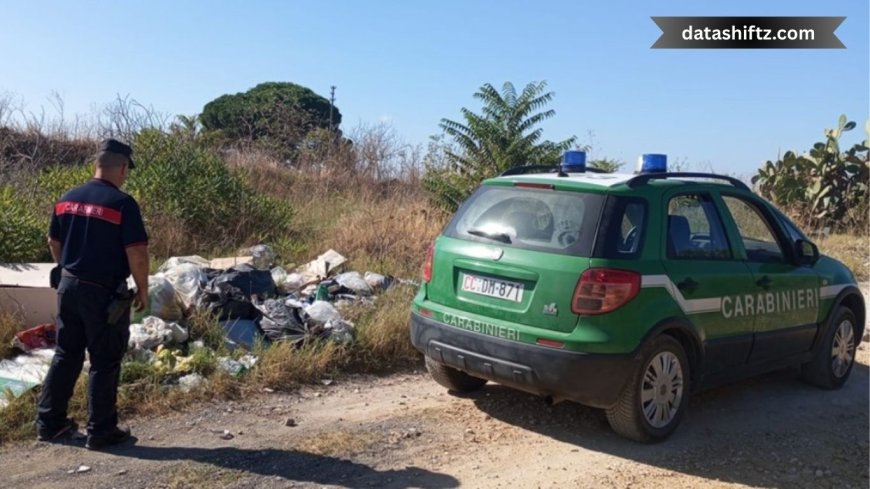Illegal Waste Dumping in Marsala: Man Caught After Chase in Nature Reserve

Environmental Crime in Sicily Sparks Outrage and Investigation
In a troubling incident that highlights ongoing issues with environmental protection and illegal dumping in Italy, authorities in Marsala, Sicily, have apprehended a man caught dumping waste inside a protected nature reserve. The arrest followed a dramatic police chase, ending with the suspect being stopped and identified. The case is now under investigation by local law enforcement and environmental agencies.
This event raises pressing questions about the effectiveness of environmental surveillance, the legal consequences for offenders, and the measures needed to safeguard Italy’s most delicate ecosystems.
The Incident: Waste Dumped in Protected Area
What Happened?
On the morning of August 18, 2025, a local resident reported suspicious activity near the Stagnone Nature Reserve, a protected wetland area located just outside the city of Marsala. The area is known for its unique biodiversity and is considered an ecological treasure, home to migratory birds, native flora, and an essential part of the local ecosystem.
According to police sources, the suspect was spotted driving a commercial vehicle loaded with construction debris, old appliances, and mixed domestic waste. Rather than disposing of the materials at an authorized facility, the man drove deep into the reserve, where he began to unload the waste illegally.
When the authorities arrived, alerted by a concerned citizen and drone surveillance operators monitoring the reserve, the suspect attempted to flee the scene. A brief but high-speed chase ensued through rural roads before officers successfully intercepted the vehicle and detained the driver.
Overview of the Incident
| Details | Information |
|---|---|
| Date of Incident | August 18, 2025 |
| Location | Stagnone Nature Reserve, Marsala |
| Suspect | Male, local resident |
| Type of Waste Dumped | Construction debris, domestic garbage |
| Protected Area Affected | Wetland ecosystem |
| Enforcement Involved | Local Police, Environmental Task Force |
| Legal Status | Under investigation |
The Stagnone Nature Reserve: A Fragile Ecosystem
The Stagnone Nature Reserve is not just a picturesque part of the Sicilian landscape—it's a designated protected area due to its ecological significance. Composed of salt pans, lagoons, and marshland, it is a key habitat for several endangered and migratory species.
Environmental groups have long advocated for increased protection and surveillance of this area, especially due to the rise in tourism and illegal activities like unauthorized fishing, off-road driving, and waste disposal.
Features of the Reserve:
-
Home to species such as flamingos, herons, and other migratory birds.
-
Hosts rare Mediterranean vegetation.
-
Historical salt flats dating back to Phoenician times.
-
Plays a crucial role in the island’s biodiversity and climate balance.
Consequences and Legal Actions
Immediate Measures Taken:
Upon apprehending the individual, authorities seized the vehicle and its contents as evidence. The suspect is currently facing charges that may include:
-
Illegal dumping in a protected area.
-
Violation of environmental protection laws.
-
Obstruction of justice due to the attempted escape.
Under Italian environmental law, especially Legislative Decree No. 152/2006, illegal dumping can result in heavy fines and even imprisonment, especially when it involves protected ecological zones.
Potential Penalties:
-
Fines of up to €26,000.
-
Imprisonment for up to 3 years.
-
Vehicle seizure and permanent loss of driving license.
-
Community service or mandatory cleanup operations.
Environmental and Legal Impacts of Illegal Dumping
-
Soil Contamination – Toxic waste materials can degrade soil quality for years.
-
Water Pollution – Runoff from waste can infiltrate water sources, affecting both wildlife and humans.
-
Harm to Wildlife – Animals may ingest or become entangled in waste.
-
Spread of Disease – Waste dumps can attract pests and facilitate the spread of bacteria and viruses.
-
Erosion of Public Trust – Such incidents weaken confidence in local governance and law enforcement.
Community Response and Environmental Activism
The event has sparked local outrage, with environmental organizations and civic groups calling for stricter monitoring and real-time surveillance of protected areas. A local nonprofit, "Sicilia Verde", has launched a petition urging the regional government to:
-
Increase drone surveillance of natural reserves.
-
Install motion-detection cameras in vulnerable areas.
-
Implement educational campaigns about the importance of environmental conservation.
-
Establish a public reporting system for suspected violations.
The mayor of Marsala, in a press statement, condemned the act and pledged full cooperation with the investigation, stating:
“We will not tolerate actions that threaten our natural heritage. Marsala must remain a place of beauty and respect for nature.”
Moving Forward: Protecting Our Environment
What Needs to Change?
This incident serves as a reminder of the fragile relationship between humans and nature. While laws exist, enforcement and community involvement are crucial. It’s not enough to designate areas as protected—active surveillance, public education, and strict consequences must follow.
Recommended Actions:
-
Increased funding for environmental patrol units.
-
Technological integration, such as AI-driven surveillance and sensors.
-
Local engagement through schools and community projects.
-
Tougher penalties for repeat offenders.
Conclusion: A Wake-Up Call for Marsala and Beyond
The illegal dumping incident in the Stagnone Nature Reserve is more than just a crime—it’s a symbol of a larger issue affecting natural habitats across the world. Marsala’s natural beauty and ecological wealth are invaluable, and it is the collective responsibility of citizens, authorities, and institutions to protect it.
While justice must be served, this must also be seen as a chance to implement long-term changes that prevent future violations. A clean, safe environment is not a privilege—it is a right, and safeguarding it begins with vigilance, accountability, and education.




























